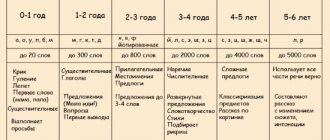The longest tongue twister in the world - texts for developing diction
Tongue twisters are the simplest and most accessible way to improve your own articulation without the financial expense of classes with a speech therapist or public speaking specialist. But if there was such a tongue twister, which, having learned to pronounce, one could broadcast no worse than a presenter on television... The Russian language can boast of such a thing! “Liguria” is the longest tongue twister, and having learned it, you can masterfully master your speech apparatus.
How to improve diction and clarity of speech
According to various expert estimates, from 15 to 30% of the population have speech problems.
The most common problems:
- “Ghe”-kanye is the easiest diction defect, which can be acquired or congenital. You can receive such a “gift” in your speech after prolonged communication with residents of the south of Russia or the east of Ukraine.
- Mangling or not pronouncing the grading sound “r”. This is the most difficult sound to pronounce, so there are more than thirty variants of its distortion. Sometimes this is caused by a shortened hypoglossal ligament, but more often it is a consequence of weak tongue muscles and a habit that is easy to overcome.
- Lisp. Its cause may be a malocclusion, missing teeth or tongue piercing, but most often it is due to weak tongue muscles.
- Unclear pronunciation of consonants. People often exaggerate the meaning of vowels, and therefore, as it were, “eat” consonant sounds, which results in “porridge in the mouth.” In a figurative sense, of course.
There are three main ways that can help you cope with the most common diction defects on your own:
- Listening to your voice on a dictaphone recording. Often people themselves do not notice their shortcomings in speech. And if parents make comments to children in order to correct their pronunciation, then it is customary to tactfully remain silent about the incorrect diction of adults. Therefore, it is useful to turn on the recorder and read a page of your favorite book out loud, and then listen to the recording.
- Articulation gymnastics is a set of exercises aimed at strengthening and developing weak muscles of the tongue for clarity of diction and correct pronunciation. Each sound has its own exercises, so by identifying your shortcomings after listening to your own voice, you can determine the necessary training complex.
- Pronunciation of tongue twisters. Small phrases constructed in such a way as to make it difficult to quickly read out loud are a great way to get rid of tongue-tiedness. Just like any exercise that improves pronunciation, they are designed to develop clarity in pronouncing sound combinations or some individual sounds.
The longest tongue twister in the world
“On Thursday the fourth at four and a quarter o’clock...” in the province of Italy called Liguria, the events of the longest tongue twister in all languages begin to develop, which has collected more than four hundred words from more than two thousand Russian letters into a funny narrative.
Even a professional speaker will have to spend at least two and a half minutes reading it. People in this profession often use this tongue twister as a pre-broadcast warm-up, but you don’t have to be an announcer to improve the beauty of your speech and diction through “Liguria.”
To do this, you just need to follow simple steps:
- divide the “reader” into separate fragments;
- print them out and hang them in front of your eyes in a place where you are usually relatively free to devote time to speech gymnastics;
- read “Liguria” three times a day, doing it slowly, without chewing the endings and making sure that the stress in the words is correct;
- Gradually increase the pace of pronunciation and periodically listen to a recording of your own pronunciation of the tongue twister.
After a short time, it will be possible to complicate diction training with nuts in your mouth, following the example of Diogenes.
By following these simple recommendations, in just 4–5 weeks you will be able to boast of a clear pronunciation of the longest “reader” in the world, reading it to friends and family from memory.
Useful tips
In order to bring the clear pronunciation of the largest tongue twister , you should train your sluggish articulatory apparatus daily:
- touch the tip of your tongue first to the upper lip and then to the lower lip (repeat alternately 20 times);
- try to blow away dust particles with outstretched lips;
- open your mouth as wide as possible, take out your tongue, lifting its tip and making it like a cup;
- put your tongue on your lower lip and hold it there for a while;
- move your tongue to the right and then to the left, imitating a clock walker (repeat 40 times);
- bite the tip of your tongue, pronouncing the syllable “ta” (for 30 seconds);
- alternately run your tongue across the palate, upper teeth and lip;
- smile widely for 15 seconds.
It is convenient to monitor the results through a voice recorder or video recording. This way you can work on errors and eliminate problematic issues.
Complex diction tests for adults
Not only children, as this most often happens, but also adults can slur or incorrectly pronounce certain words. Working with complex texts to improve diction will help you cope with this disadvantage.
The text of the longest tongue twister is also an example of just such a complex text.
Of course, you don’t have to try to master it in full at once, but you can break it down into separate fragments, for example:
- “... an angry widow put firewood in the barn: one firewood, two firewood, three firewood - all the firewood did not fit, and two woodcutters, two woodcutters..." - a convenient fragment for improving the sound “r”;
- “...Sonka - Sashka’s girlfriend - walked along the highway and sucked on a dryer, and besides, Sonya the turntable also had three cheesecakes in her mouth...” - a familiar passage from a young age with difficult to pronounce hissing sounds;
- “...the heron wasted away, the heron was withered, the heron was dead; the heron’s chick was tenaciously clinging to the chain...”
For training to be more effective, you should adhere to the following rules:
- Spend at least 10-15 minutes 5-10 times a day pronouncing difficult-to-pronounce phrases.
- Change the repertoire of pure tongues every ten days.
- Make the exercise more difficult by practicing in conditions where breathing may become difficult, for example, while jogging or other physical exercises.
Speech apparatus training
Television announcers, event hosts, speakers - they all must speak clearly, clearly and confidently. Therefore, before a performance, they like to practice their speech apparatus with tongue twisters. Frequently used and difficult to pronounce:
- “Thirty-three ships tacked, tacked, but never tacked.” A short saying, but how difficult it is not to immediately get confused in the letters and sounds. This phrase is designed not so much for purity of pronunciation as for attentiveness. Mistakes by announcers and TV presenters are most often associated with a lack of concentration. Tacking ships just help you concentrate. By the way, this is only part of the tongue twister, which in the original is twice as long.
- “Just as you can’t ring all the bells, you can’t beat them again, so you can’t talk all the tongue twisters too quickly.” Another tongue twister for developing concentration. To pronounce these words accurately requires attention and more attention. And the speech apparatus becomes more mobile. Diction improves.
When pronouncing linguists, not only the speech apparatus works, but also the brain. Our brain “recognizes” the familiar more often and more easily. It is enough to hear the first sounds or see the first letters written on a piece of paper, the rest is instantly “conjectured” by the brain automatically. And in tongue twisters there are unfamiliar phrases about which the brain “comes into confusion.” This awakens him from his lazy slumber and contributes to his training and development. Like morning exercises for the body in the morning.
For speech development in children
The division of tongue twisters into children's and adults is very arbitrary. The last group includes phrases consisting of words whose meaning is not yet known to children. But from three to eight years old, it is still better to work with passages and rhymes aimed at developing automaticity in pronouncing consonants in different combinations with vowels.
With three-year-olds, you can start working on the whistling sounds s-s and z-z, for example:
- Sa-sa-sa, sa-sa-sa - Sonya has a long braid;
- As-as-as, as-as-as - we drank delicious kvass in the evening.
With four- and five-year-olds, you can work on hissing (zh, sh, ch, sch) and the sound l, using the following phrases as a basis:
- Chi-chi-chi, chi-chi-chi - there are bricks at the market;
- Already, already, we lost our luggage.
And from the age of five to eight years, you need to teach the child to pronounce the most difficult sound of the Russian language - “r”.
You can come up with similar tongue twisters yourself with your child, simultaneously developing his writing abilities, or use ready-made phrases.
Why is it so hard to pronounce
Linguists from the Massachusetts Institute of Technology tried to understand what happens to the speech areas of the brain during the pronunciation of tongue twisters. And they came to the conclusion that difficulties arise when a person tries to pronounce two sounds at once almost simultaneously. This double attack creates a “delay” in brain function. Groups of neurons responsible for the pronunciation of sounds that alternate in tongue twisters, at this moment approach each other at a critical distance. And in fact, they begin to interfere with each other by sending signals.
The most difficult proverb in the English language was recognized as: “pad kid poured curd pulled cod.” One of the volunteers tried to pronounce it, then could not utter a word for some time.
And among the linguists in Russian there are many that are difficult to pronounce. It is difficult for them to share the palm. Perhaps everyone can remember their own saying that is difficult for them.
Long but funny tongue twisters
The longest tongue twister contains many illogical and funny facts, so it can also be called the funniest. But tongue twisters are one of the types of folk art that have been invented from time immemorial to improve diction, and just for fun. After all, difficult-to-pronounce phrases can make you laugh so much if you try to pronounce them quickly and without prior training.
Often funny tongue twisters turned into funny rhymes:
A poplar stomped along the road.
Poplar stomped to Sevastopol,
Well, Seva was stomping nearby.
Poplar on the right, Seva on the left.
Where is Seva with the poplar?
Already near Sevastopol.
Features of "Liguria"
In fact, “Liguria” is not just the most complex tongue twister. This is a real text, consisting of 434 words. What’s interesting is that the world’s largest tongue twister essentially acts as a kind of mosaic canvas or puzzle, consisting of many of the most familiar and ordinary, not too long tongue twisters about the traffic controller and other characters. The entire combination of “Liguria” consists of 40 popular and not so popular idioms.











